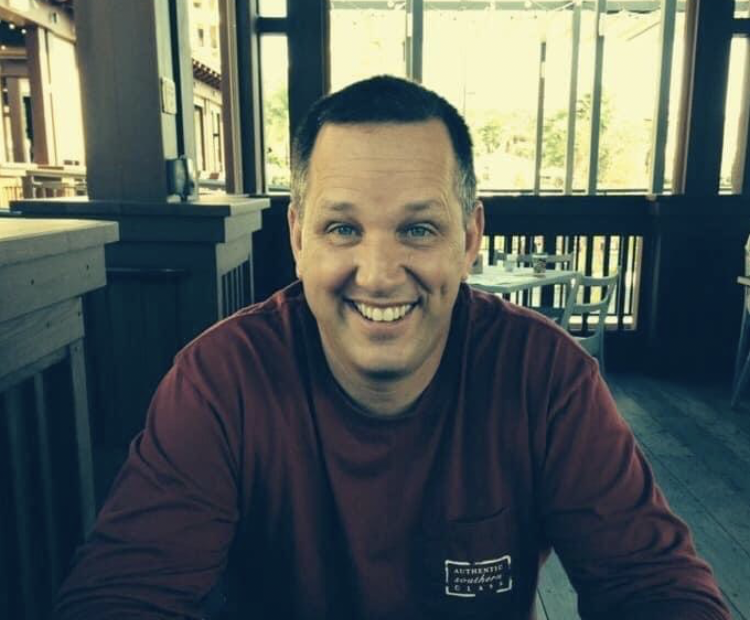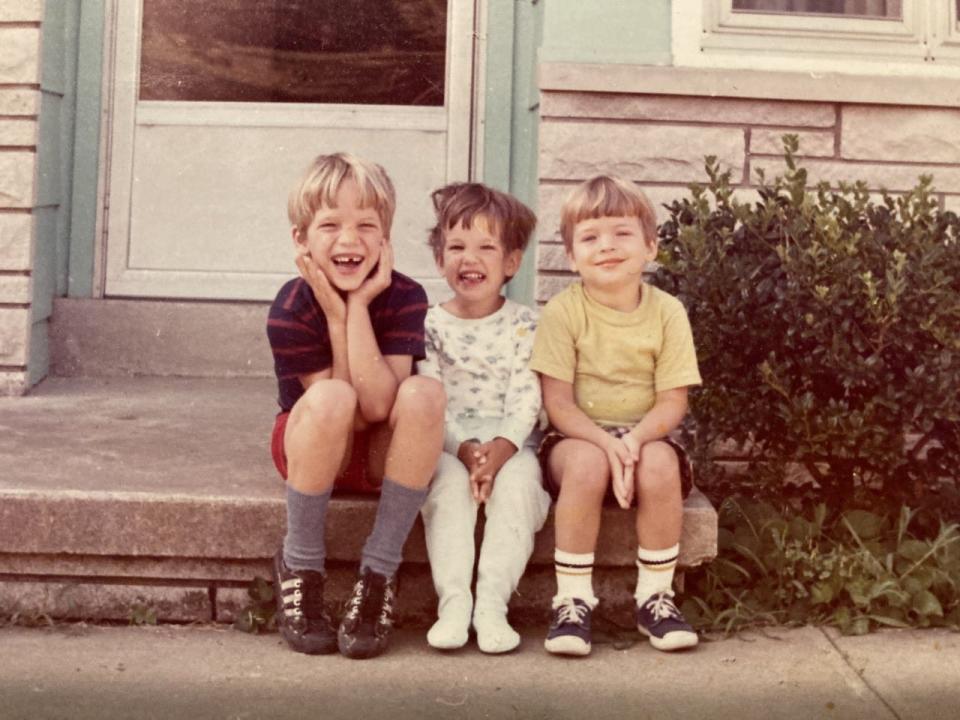Sometimes a smile can change your life, and not even a heartless disease can erase it
I said goodbye to my father when I was 9. Not permanently, though it felt like it as my mother and brother and I pushed back from the jetway on a Boeing 707 in Frankfurt, Germany, in 1976.
We were headed to Nashville, Tennessee, by way of New Jersey and a quick stop in Camp Springs, Maryland. My dad headed back to his apartment at Hahn Air Base.
He waved at us through the terminal windows. I craned my neck to keep him in view for as long as I could.
A few days later, we rolled down Hillsboro Pike on the southwest side of Nashville, before taking a left up Overhill Drive and a right on Farrar Avenue, finally easing onto a driveway near the end of the street.
There, my cousin waited. He was 6.

I’d met Brady Gardner before — his mother and my mother were sisters a year apart and kept in touch like twins. But that was the moment he became my brother; it just took me a minute to realize it.
He could’ve balked at the arrangement, of course. A couple of long-lost cousins arrive from overseas and suddenly he’s sharing a bedroom, and the dinner table, and his parents. Yet he never did.
I’m not sure I ever thanked Brady for what he did during one of the most unsettling moments of my life. A 6-year-old welcoming two older boys into tight quarters? Then again, I’m not sure I fully realized what he’d done for me until I got news he’d died early Sunday morning.
Death has a way of forcing you back before you look forward and, with Brady, the looking back gets better — and richer — by the moment. It’s not nostalgia so much as it’s a reckoning with how you came to be. It’s also an appreciation. Not that I hadn’t loved Brady Gardner all his life.
My brother, Kevin, and I spent almost a year in Brady’s home before my mother found work in Washington and we headed east to begin life again. And if you were to ask me what eased the pain of leaving my father at that terminal in Frankfurt, Brady would be wrapped up in the answer.
He and his brother, Brett, swapped silly stories after my aunt or uncle turned off the lights (we preferred it when it was our aunt). We giggled in our pajamas. We played ping-pong in the basement. We played kickball in the yard and invented our own terminology: an over bush was a home run, because the ball sailed over the row of thorny hedges that demarcated the end of our imagined outfield.
And when it rained?
We’d slip into our swimsuits and tear off for the ravine at the edge of the street, where droplets wet the grass and pooled into the greenest slip-n-slide you ever saw. Once, we piled into the back of my uncle’s pickup truck and drove all the way to Florida.
We spread blankets on the ribbed metal bed and tried our best to find the cool spots. The bed was covered with a cap, though all that did was make it hotter.

Still, we were together, a makeshift family absorbing the pain of divorce and a couple of boys who desperately missed their father.
I’m not sure Brady thought of it that way back then. He was 6. But he was always instinctive, and children detect sadness better than adults sometimes.
There may have been times when he was ready for our mother to scoop us up and leave him to his old life. That would’ve been natural, and understandable … from my view as an adult. If he did have such human inclinations, he kept them from us.
All he did was smile. And laugh. And while we surely got into an occasional tussle or disagreement, his disposition rarely strayed anywhere but up — and out.
After we moved to D.C., we traveled back to Nashville often, making the drive in an old Datsun station wagon, tucked into sleeping bags in the back, my mother up front steering us out into the pre-dawn dark.
By the time we woke up, the mountains were in view, and we knew it wouldn’t be much longer to see our cousins, though by then they were surely brothers.
Siblings don’t share biological or adoptive parents as much as they share experiences. When we were young, we shared a home, meals, showers, votes tallying whose mom was the meanest. (My Aunt Becky won; sorry, Aunt Becky.) But as we grew older, we realized we shared a difficult and inevitable family history.
Brady had frontotemporal dementia (FTD). He was diagnosed in his late 40s and died at 52. His mother — my aunt — died of the same thing at 71.
My mom died at 73, their brother died at 61, their mom died at 56 — all with FTD. My mom’s first cousins had it. Their children had it. Almost no one on that side of the family has escaped it.
The disease quite literally shrinks the frontal lobe of the brain. In the process, it steals your ability to process information, your social acumen — eventually your ability to talk and walk and swallow.
In the end, death often comes from not eating, though how much someone with FTD is aware they can’t eat is unclear. What it doesn’t seem to swipe is the spirit.
While my mom spent a period of time cutting in line and taking food from others' plates and randomly yelling “A-hole,” she never stopped smiling. Nor did my Aunt Becky. Nor did my grandma. Nor did Brady.
Maybe it is a family trait, though my smile doesn’t come as naturally. Or maybe it’s just the soul saying, enough: You can take everything else, but not my ability to express through my face.
My mother spoke five languages and traveled the world in part to use every synapse she could in hopes of staving off the disease. My aunt traveled with her and kept the worldly affairs light-hearted. She was a prankster, like her son, and all of them did their best to lean into every moment.
My brother and I try to do the same. It is a balance, finding the sweet spot between the present and the future, acknowledging the substantial possibility of our fate without succumbing to it prematurely.
When my mother was diagnosed around 2010, my aunt traveled to Michigan frequently, and they traveled together from here. Eventually, my aunt started showing symptoms, too.
Brady and I began talking almost weekly. About our mothers. About how to help keep them in the world and how to keep them safe. About our own fates.
And while I knew that the symptoms had gotten some of our family in their 50s, I never imagined they’d get Brady even younger.
One day I realized that Brady hadn’t called in a couple of weeks and wasn't returning my messages. I figured he was busy with work — he was a banker — or with his wife, Cathy, and three children. So, I called Cathy — and heard exactly what I didn’t want to hear.
A few months later, I flew to Nashville to see him. He was still living at home. We had dinner. Cathy cooked. He didn’t say much, but he knew who I was and could answer questions with short sentences.
The next day, I picked him up and took him to breakfast. He was waiting in the driveway, smiling, just as he had 46 years earlier.
If he sensed my sadness, he didn’t let on. He just beamed. On the drive to the restaurant. While we ate. On the drive home.
I made small talk and asked a few questions and reminisced. Mostly, he nodded.
When I drove away to fly home, I never imagined that would be the last time I saw him. COVID-19 hit six months later.
I got busy with work, with family, with life and, truthfully, with dread, and even when I heard he was struggling to swallow a few weeks back, I looked at flights and dates and talked to my brother and still dragged my feet, thinking there would be more time.
Hoping there would be more time, knowing there probably wouldn’t.
I’ve thought a lot the last few days about that moment I drove away, watching him wave, watching him light up the neighborhood with that grin, thinking back to the way he greeted me all those years ago when we were little boys.
He was my cousin.
He was my brother.
He was light and joy and grace and a reminder that the moment is all we’ve ever got.
Contact Shawn Windsor: 313-222-6487 or swindsor@freepress.com. Follow him on Twitter @shawnwindsor.
This article originally appeared on Detroit Free Press: Sometimes a smile can change your life; not even disease can take it

